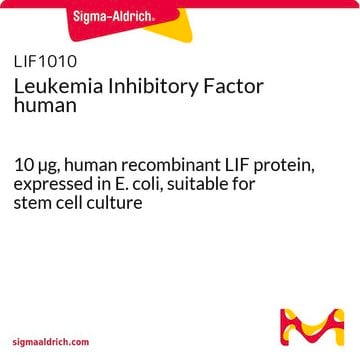LIF1005
Leukemia Inhibitory Factor human
5 µg, human recombinant LIF protein, expressed in E. coli, suitable for stem cell culture
Synonym(s):
Human LIF, Human Leukemia Inhibitory Factor, LIF, hLIF
About This Item
Recommended Products
biological source
human
Quality Level
Assay
>95% (HPLC and SDS-PAGE)
form
liquid
specific activity
≥1 x 10(E8) U/mg
manufacturer/tradename
Chemicon®
concentration
10 μg/mL
technique(s)
cell culture | mammalian: suitable
impurities
<0.1 ng/mg Endotoxin (of LIF)
input
sample type: human embryonic stem cell(s)
sample type neural stem cell(s)
sample type induced pluripotent stem cell(s)
sample type hematopoietic stem cell(s)
sample type mesenchymal stem cell(s)
NCBI accession no.
UniProt accession no.
shipped in
wet ice
Gene Information
human ... LIF(3976)
General description
Application
M1 Bioassay
1. The M1 bioassay is performed using in vitro semi-solid agar cultures, which contain approximately 100 cells in 1 mL volumes of DME containing 20 % FCS in 0.3% agar.
2. Add 100 μL of sample or hLIF (10(E4) units/mL in 5% FCS in isotonic saline) in two-fold serial dilutions in duplicate to 35 mm petri dishes.
3. Add 100 μL of 5% FCS in isotonic saline to two control slides.
4. Incubate at 37°C in fully humidified atmosphere of 10% CO2 in air for 7 days.
5. Score the number of colonies that show differentiation (note: 50 units is defined as the amount of activity which results in 50% of the colonies being differentiated).
Visit www.esgro-lif.com for additional information
Manufactured by CHEMICON International, Inc. LIF is protected under US Patent nos. 5,443,825, 5,750,654 and 6,261,548, European Patent no. 0285 448 and related foreign patents and is not available for resale.
Unit Definition
Physical form
Storage and Stability
Manufactured by CHEMICON International, Inc. LIF is protected under US Patent nos. 5,187,077, 5,427,925, 5,443,825, 5,750,654 and 6,261,548, European Patent no. 0285 448 and related foreign patents and is not available for resale.
Analysis Note
Legal Information
Disclaimer
LABEL LICENSE - USE RESTRICTED TO RESEARCH USE ONLY
Leukemia Inhibitory Factor ("LIF") is protected by US Patents No. 5,443,825 and 5,750,654 and Canada Patent No. 1,341,581 and 1,341,469 owned by AMRAD Corporation Ltd. and licensed exclusively to Millipore for research uses. The use of this product is limited for research uses only and not for any commercial purposes, such as making or developing other research products from this product or use of this product as a component in a research kit. This product is not to be used in humans or for any diagnostic purposes.
The purchaser may refuse to accept the conditions of this label license by returning this product unopened and will receive a full refund of the purchase price paid.
For-profit entities or commercial research entities purchasing this product shall be required to execute a separate commercial license with Millipore within three months of purchase. Researchers may not transfer this product or its derivatives to researchers performing commercial research at other Nonprofit Organizations, or to For-Profit Organizations, without the express written consent of Millipore, and without those entities having an express license from Millipore for the use of the product. Other than as specifically provided herein, a transferee of this product shall have no right to transfer this product, or its derivatives to any other person or entity.
Storage Class Code
12 - Non Combustible Liquids
WGK
WGK 2
Flash Point(F)
Not applicable
Flash Point(C)
Not applicable
Certificates of Analysis (COA)
Search for Certificates of Analysis (COA) by entering the products Lot/Batch Number. Lot and Batch Numbers can be found on a product’s label following the words ‘Lot’ or ‘Batch’.
Already Own This Product?
Find documentation for the products that you have recently purchased in the Document Library.
Customers Also Viewed
Our team of scientists has experience in all areas of research including Life Science, Material Science, Chemical Synthesis, Chromatography, Analytical and many others.
Contact Technical Service










